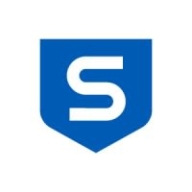


Check Point CloudGuard Network Security and Sophos XGS are prominent network security solutions. Users are generally more satisfied with the features of Sophos XGS, though Check Point CloudGuard Network Security also holds strong appeal due to its pricing and support quality.
Features: Check Point CloudGuard Network Security is valued for its comprehensive security features, including advanced threat prevention and automated defenses. Sophos XGS is praised for its intuitive management and robust functionality, particularly its integration capabilities and real-time visibility.
Room for Improvement: Users of Check Point CloudGuard Network Security often cite the need for improvements in reporting and analytics, along with better support for hybrid environments. Sophos XGS users seek enhancements in performance optimization and more flexible deployment options.
Ease of Deployment and Customer Service: Users find Check Point CloudGuard Network Security straightforward to deploy in cloud environments, benefiting from responsive customer service. Sophos XGS is also recognized for relatively easy deployment, with commendable customer service.
Pricing and ROI: Check Point CloudGuard Network Security offers competitive pricing and is often seen as cost-effective in the long run due to solid ROI. Sophos XGS, while slightly more expensive, delivers satisfactory ROI attributed to its advanced features and integration benefits.
Clients are now comfortable and not wasting productive hours on IT support.
We have experienced a positive return on investment by utilizing Fortinet's products.
There's definitely an ROI. Having a centralized way of managing and applying policies across the entire organization always helps.
The value lies in maintaining operational integrity with zero downtime or incidents, facilitating secure, ongoing business operations.
Implementing CloudGuard has resulted in an excellent return on investment over one hundred percent ROI.
The unified policy is comprehensive and helps me to create firewall policies that are shared across all our facilities and plants.
The costs have increased with Sophos XGS in the last few years, with license prices going up by 30%, doubling from $2,500 to about $5,000, which is a big challenge for us.
He explained that it required a command line configuration, as it couldn't be done through the graphical user interface.
I would rate their support for FortiGate a nine out of ten.
They offer very accurate solutions.
They usually respond quite fast, and they are very knowledgeable about what they do.
We had an endless loop of emails trying to fix this, and the suggestion was to reinstall the gateway and do it from scratch, which was not an option at that point because it would leave that specific location without access.
Available twenty-four by seven.
Any issues are quickly addressed by their support team, which is not common among all OEM manufacturers.
The response time from Sophos technical support can be slow in most cases, which can be challenging.
Technical support from Sophos is always available.
They scale up really well from smaller models like the FortiGate 40 and 50 to bigger sites with the FortiGate 100 for more throughput - up to enterprise datacenters.
The variation comes in terms of the interfaces and throughputs, but from a security perspective, you get the same benefit, irrespective of whether you have an entry-level unit or an enterprise.
You can choose a cheaper model if you only have 20-30 users, but you will need to spend more money for a FortiGate solution that covers 5,000.
I can deploy it everywhere I need it.
We have transitioned from 1,000 to 500 users without any issue.
We perform minor and major upgrades, and it works seamlessly.
I can change what I want easily without interfering with other services or routines.
I would rate its scalability seven out of ten since modules can be added.
Improper handling of these can lead to a memory surge, a well-known bug that can cause the entire system to freeze.
It is less stable than Palo Alto Networks and Check Point firewalls because there are lots of bugs in the latest firmware.
We have not had any problems with the operating systems or maintenance of subscriptions.
I have not observed any downtime.
For instance, when we are working on a release and do an upgrade, we start experiencing unexpected issues.
The solution is stable.
It is rated at nine out of ten for stability and is very reliable.
Sophos XGS is stable now, and I would rate its stability as a ten out of ten.
When Sophos introduced firmware version twenty, there was a bug in DCC.
If I have put 10 GBPS of throughput on a firewall and I enable all of these features available, such as IPS or UTM functionalities, the throughput comes down to 1 GBPS.
By providing an integrated solution, users would have access to all features and functionalities within a single window, eliminating the need to navigate through multiple windows.
Investing in a solution that can accommodate such growth would be more cost-effective than repeatedly purchasing new hardware.
Scalability could be improved as well; needing to purchase a new license each time I want to add a new interface is not ideal.
Better documentation would be welcome.
The user interface could be more intuitive, and the initial setup and configuration can be complex, requiring a technical team.
It would be beneficial if Sophos XGS offered an end-to-end solution with competitive pricing.
After version 18.5, creating a NAT rule has become more complex, requiring the creation of a separate policy and an additional component.
I have experienced multiple hardware complaints, particularly during firmware updates that sometimes cause crashes.
Secure SD-WAN is free of charge.
The most expensive part is the renewal of the license subscription.
FortiGate is priced lower than Palo Alto.
The pricing and licensing are expensive, costing between seven thousand to eight thousand dollars.
Check Point is expensive, however, with the features and capabilities, I can justify the cost.
It is the highest in the market.
The last instance I purchased was for three years, around $3,700 for SDG 125.
pricing is rated eight out of ten, indicating that it may be relatively expensive.
Sophos XGS is quite expensive, potentially a nine out of ten in terms of cost.
The firewall, IPS, and VPN functions are the most valuable features.
FortiGate provides solid protection against viruses, malware, and other threats.
Within the same dashboard, you get to see the security profiles, the type of traffic that's passing through, the top applications that are being consumed, etc.
One of the most valuable features is the automated threat prevention, which helps us detect and block potential cyberattacks in real-time, minimizing data breaches.
Centralized management is the feature I like best, resulting in reduced workload and more continuous policy.
Network Security provides us with unified security management across hybrid and cloud as well as on-prem.
It's able to detect cloud applications like Zoom or Microsoft Teams and allows traffic shaping based on the application.
I find it much easier than others, like FortiGate, which is complicated in its installation, but Sophos XGS is really easy.
The threat detection capabilities are effective, especially against CNC and certain viruses not coming through emails.



Fortinet FortiGate offers comprehensive network security and firewall protection across multiple locations. It effectively manages data traffic and secures environments with features like VPN, intrusion prevention, and UTM controls.
Organizations rely on Fortinet FortiGate for its robust integration with advanced security policies, ensuring significant protection for enterprises, cloud environments, and educational sectors. It facilitates network segmentation, application-level security, and authentication management, securing communication within and between locations such as branches and data centers. Its efficient SD-WAN and UTM features enable streamlined data management and enhanced threat protection capabilities. Users appreciate its centralized management, facilitating seamless operations across diverse environments.
What are the key features of Fortinet FortiGate?
What benefits should users expect from Fortinet FortiGate?
Fortinet FortiGate is crucial in sectors like education, offering robust networks for secure data flow between campuses and facilitating remote learning. In enterprise environments, it allows efficient management of application traffic and security across multiple branches, while in the cloud, it seamlessly integrates with diverse platforms to enhance security infrastructure.
Check Point CloudGuard Network Security is designed to secure cloud assets, offering robust firewall capabilities and protection for both internal and external traffic across AWS, Azure, and on-premises environments.
Enterprises rely on Check Point CloudGuard Network Security for comprehensive network protection, threat prevention, and compliance enforcement. Supporting virtual machines and hybrid environments, it delivers advanced security measures including intrusion prevention and application control. Key functions include firewall security, network segmentation, and cloud environment protection, ensuring businesses maintain a secure and compliant IT infrastructure.
What are the most valuable features of Check Point CloudGuard Network Security?In industries such as financial services, healthcare, retail, and education, Check Point CloudGuard Network Security is implemented to safeguard sensitive data, ensure compliance, and protect critical infrastructure. Companies in these sectors benefit from its advanced threat prevention and flexible deployment options, meeting their stringent security requirements while enabling secure digital transformation.
Sophos XGS is a comprehensive network security solution designed to protect organizations from advanced threats. It combines next-generation firewall capabilities with advanced threat protection, web filtering, and application control.
XGS has powerful deep learning technology and can detect and block even the most sophisticated malware and ransomware attacks. It also offers granular control over web access, allowing organizations to enforce policies and prevent access to malicious or inappropriate websites. Additionally, XGS provides application control features, enabling organizations to manage and prioritize network traffic based on specific applications or user groups.
With its intuitive management interface and centralized reporting, XGS offers easy deployment and monitoring of network security.
We monitor all Firewalls reviews to prevent fraudulent reviews and keep review quality high. We do not post reviews by company employees or direct competitors. We validate each review for authenticity via cross-reference with LinkedIn, and personal follow-up with the reviewer when necessary.